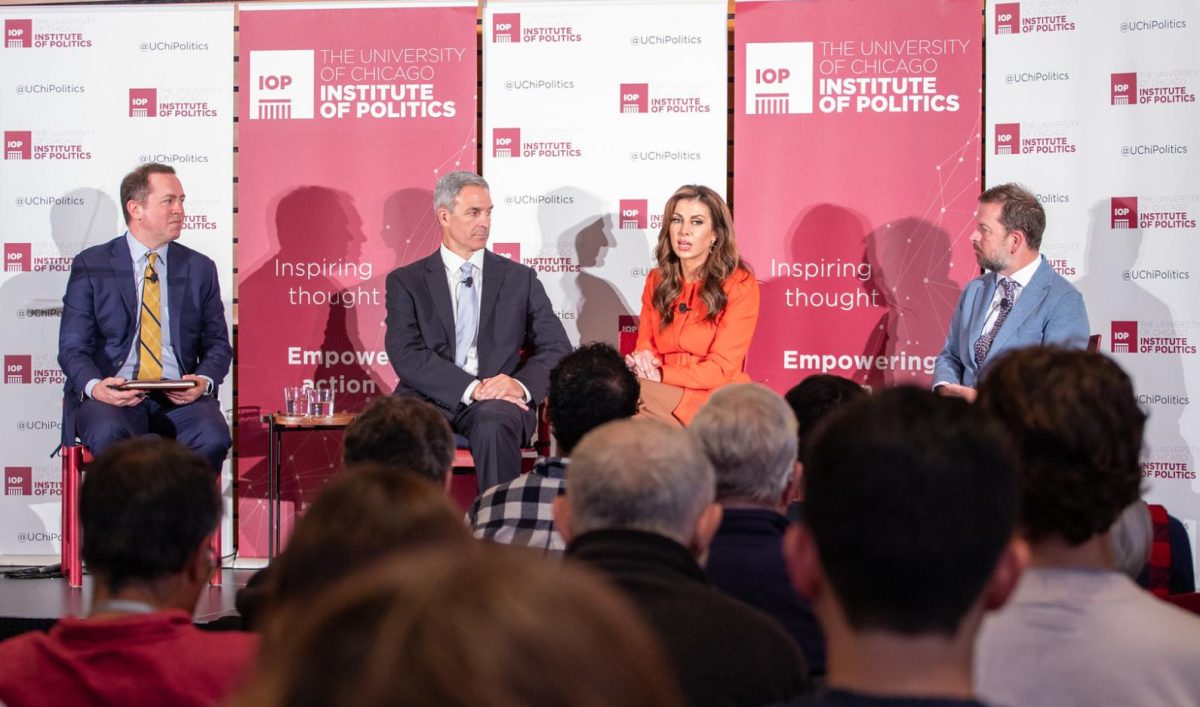What might a second Trump term look like? Three members of Trump’s first term administration—Ken Cuccinelli, Joe Grogan, and Morgan Ortagus—addressed that question during an Institute of Politics (IOP) event on October 15. The event, titled “What to Expect if You’re Expecting Trump,” was moderated by Wall Street Journal Washington Coverage Chief Damian Paletta.
The event provided a look at the potential policies and priorities of a second Trump presidency, focusing on stricter immigration enforcement, a more assertive foreign policy, and a significant reduction of federal agencies.
Cuccinelli, who authored chapter five of the controversial policy proposal Project 2025 set forward by the Heritage Foundation for a second Trump term, served as Trump’s acting deputy secretary of homeland security and director of U.S. Citizenship and Immigration Services. He explained Trump’s plan to deport “more people than we’ve ever done” and admitted that while a majority of Americans support the proposal now, that is likely to change as the tragedy of disrupted lives unfolds.
“When you put real names and faces and families, and people are leaving in real life, that support will go down,” Cuccinelli said. “And that’s where somebody like Donald Trump is different than many of his predecessors—he doesn’t really pay attention to that; he really tries to achieve the goal.”
Cuccinelli also rebuked what he saw as the Biden administration’s efforts to make it easier for undocumented immigrants to find work, affirming that Trump would limit access to jobs for these immigrants. “There are plenty of problem people coming over the border, but there are also people coming to work,” he said. “If they don’t have the opportunity to work, which the Biden administration makes easy for people to do illegally… it is not difficult for an incoming President Trump to very quickly make it untenable for an illegal to work here.”
Ortagus was the U.S. Department of State spokesperson from 2019 to 2021 and a strong proponent of withdrawing from the Iran Nuclear Deal and signing the Abraham Accords. When asked to explain Trump’s foreign policy rhetoric, she joked, “Well, that’s always a fun challenge.” She went on to emphasize the importance of restoring global deterrence after what she views as a weak Biden presidency and a disaster in Afghanistan.
Referring to Iran’s missile attacks on Israel, she said deterrence with Iran is “no different than my toddler. My toddler is going to keep pressing and doing something until she knows that she can’t do it, and the regime is no different.”
“There is a real feeling out there that there is not somebody that has their hands on the steering wheel, and I think we’re in a very dangerous place,” Ortagus continued. “I think the Islamic Republic of Iran only respects strength, they only understand strength—I think they will continue to shoot ballistic missiles at Israel if they think they can get away with it. If that response doesn’t happen soon by Israel, I promise you that response will happen in the next Trump administration.”
Ultimately, she believes Biden has been too tough on Israel and should take more direct steps to quash the “terrorism” of Iran and the Houthis, contending that a second Trump presidency would bring a more aggressive, dominant, and militaristic foreign policy to Washington, D.C.
Returning to domestic policy, Paletta asked the panel about former Libertarian presidential candidate Robert F. Kennedy Jr.’s (RFK) growing alignment with Trump. RFK, who said in July that “there’s no vaccine that is safe and effective,” suspended his campaign and endorsed Trump in August but is still on the ballot in some states. Grogan, who served as the former director of the United States Domestic Policy Council and assistant to Trump, specializing in healthcare, contradicted Trump’s past suggestions that he would end school vaccine mandates.
“When people say, ‘Are you worried that RFK is going to mean that the government is going to walk away from vaccines, which are the most important public health intervention in world history?’ The answer is no,” Grogan says. “RFK has done less to disparage vaccines than public health agencies have done during COVID.”
Grogan supports vaccine mandates in schools but believes that public health agencies lack transparency and betrayed the public’s trust during the COVID-19 pandemic.
The panelists agreed that a second Trump presidency would eliminate many government agencies. “I would love to see the Department of Education get wiped out,” Grogan said. “[I don’t] think it would affect education outcomes in any way shape or form.”
Regarding Trump’s mission to fire tens of thousands of “crooked” federal employees, Grogan proposed the use of artificial intelligence to carry out mass layoffs of those who serve as “dead weight” in the government, at the cost of the American taxpayer. By firing them, he said, government spending and thus inflation could be reined in—a central campaign plan for the GOP.
All three speakers agreed that a future Trump cabinet would be competent and would move fast. Apart from an audience member who interrupted to remind the speakers that Trump “broke the law” while they discussed his plans to target political opponents, the IOP event remained civil.















Bob Michaelson / Oct 28, 2024 at 9:37 am
Clearly the IOP has become a base for far-right-wing lunacy if they allow such idiotic claims to go unchallenged. Based on this account, everything said there was a lie – e.g. withdrawing from the Iran Nuclear deal (which Richard Garwin said was imperfect but very good as a first step) was stupid indeed. Of course TFG and his advisors are stupid indeed.